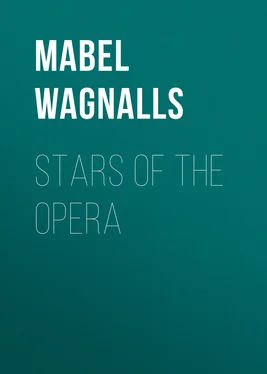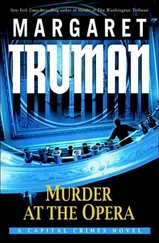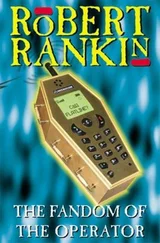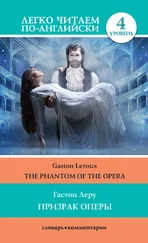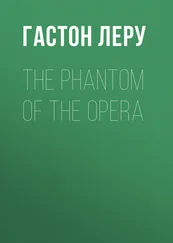Mabel Wagnalls - Stars of the Opera
Здесь есть возможность читать онлайн «Mabel Wagnalls - Stars of the Opera» — ознакомительный отрывок электронной книги совершенно бесплатно, а после прочтения отрывка купить полную версию. В некоторых случаях можно слушать аудио, скачать через торрент в формате fb2 и присутствует краткое содержание. Жанр: foreign_antique, foreign_home, music_dancing, на английском языке. Описание произведения, (предисловие) а так же отзывы посетителей доступны на портале библиотеки ЛибКат.
- Название:Stars of the Opera
- Автор:
- Жанр:
- Год:неизвестен
- ISBN:нет данных
- Рейтинг книги:5 / 5. Голосов: 1
-
Избранное:Добавить в избранное
- Отзывы:
-
Ваша оценка:
- 100
- 1
- 2
- 3
- 4
- 5
Stars of the Opera: краткое содержание, описание и аннотация
Предлагаем к чтению аннотацию, описание, краткое содержание или предисловие (зависит от того, что написал сам автор книги «Stars of the Opera»). Если вы не нашли необходимую информацию о книге — напишите в комментариях, мы постараемся отыскать её.
Stars of the Opera — читать онлайн ознакомительный отрывок
Ниже представлен текст книги, разбитый по страницам. Система сохранения места последней прочитанной страницы, позволяет с удобством читать онлайн бесплатно книгу «Stars of the Opera», без необходимости каждый раз заново искать на чём Вы остановились. Поставьте закладку, и сможете в любой момент перейти на страницу, на которой закончили чтение.
Интервал:
Закладка:
The prelude to Act III. is somber and depressing. It clings to the harmonies of that last scene between Charlotte and Werther—the exile motif.
The curtain's rising reveals Charlotte sitting at her work-table, lost in thought while her needle plies.
The soft light of the lamp illumines a petit salon ; the hour hand of the clock points to the figure five, and the libretto tells us it is the 24th of December. The subject of her thoughts is Werther—always Werther! Why can she not banish him from her mind as she did from her presence? The question is not hard to answer, for we learn that he has been writing to her. As tho drawn by a magnet, Charlotte goes to the desk and reads again the letters she fain would forget. Moaning minors like a winter wind accompany the perusal of these sad and poetic epistles. Werther writes: "If I never return, blame me not, but weep instead, for I shall be dead."
Terrifying tremolos accompany the tragic theme that is now let loose in the orchestra like a strange, wild animal in the arena. It preys upon the emotions, gnawing at the heart of every listener. Massenet delights in startling contrasts.
While Charlotte is grieving over these missives, a happy voice greets her, "Good day, sweet sister!" It is Sophia, come with an armful of toys and a heart full of melody. She is accompanied by the gay staccatos of her "Spring Song." Charlotte hastily conceals the letters; but tears are not so easily disposed of. Perceiving the reddened eyes, Sophia tries to cheer her sister by singing of "Laughter, the light of the heart." The gaiety of this music, with its sparkling scales and tripping tempo, is infectious. But tears again gather in Charlotte's eyes when Sophia mentions the name of Werther. The little sister is very sorry; but Charlotte says never mind, weeping does one good. "The tears we do not shed fall back upon the heart, which, altho it is big, is very frail and can break with the weight of a tear."
The music to this sentiment is a tone-poem well worthy of the text. It is written in a low key. Joy mounts upward on the scale, but grief weighs down.
Sophia goes out, and all the bright music with her. Falling upon her knees, Charlotte prays for strength. This supplication is truly grand, with superb crescendos and plaintive diminuendos.
The music now swells out with sudden impetus and the parlor door is brusquely opened. Charlotte turns around and exclaims—with startled tones, "Werther!"
He is leaning against the door as tho wearied in mind and body. "I tried not to come— mais me voici !"
With forced calm Charlotte bids him welcome. He looks with fond memory upon the old piano and familiar books. They talk of casual things, and incidentally Charlotte calls his attention to the poems he was translating when he left.
The music of this scene has been unnaturally tranquil; the gentle Charlotte-theme and another phrase, graceful and simple as a nursery rhyme, are used with touching effect. But with the mention of these poems sudden emotion breaks through the constraint. Werther turns to the unfinished verse and reads aloud.
The ensuing scene is dramatically not a new one. In "Francesca da Rimini" the heroine is wooed and won by the reading of a poem; but added to the charm of verse we here have the enthralling power of music. In both instances the reading ends with—a kiss.
The succeeding aria is a song of soaring ecstasy about " ce premier baiser ." Werther proclaims that "only love is real!" But Charlotte suddenly recoils at her weakness, and rushing to a side door, exclaims: "We must never meet again! Good-by—for the last time!" and disappears.
The music has assumed a dolorous strain that vividly portrays the pathos of her last words. Werther calls for her to come back. He knocks at the door, but is only answered by the tragic chords of the orchestra. They are furious and fearful, but, strange to say, they adequately express an awful silence. "So be it!" at last exclaims the sorrowful Werther. Crashing chords whirl riot in the orchestra as the hero hastens away.
The stage is vacated, but the music tells us whom next to expect. The Albert-theme, easily recognizable tho a trifle harsher than before, comes forward to preside over the finale of this act.
Albert steps into the room, surprised and preoccupied. He has met the distracted Werther at the front door, and here finds Charlotte locked in her room. In answer to his authoritative call she comes forward looking pale and frightened. He questions her, but she answers evasively. At this moment a message is handed to Albert by a servant. It is from Werther: "I go on a long journey. Kindly lend me your pistols. Farewell." Charlotte knows the import of these words, but dare not speak. Perhaps Albert also knows. He coldly bids her hand the weapons to the servant. Mutely and slowly she goes to the case and delivers the contents as she was bid. That theme in the orchestra continues quietly to move back and forth like a person keeping the death-watch. When the servant has gone, Albert strides angrily out of the room. Charlotte stands for a moment immobile. The music also seems to stand still; then a sudden impetuous outburst of the instruments coincides with her decision. From highest B to lowest F octaves and chords are hurled together, as Charlotte, seizing a mantle, rushes to the door. "Pray Heaven I may not be too late!"
We follow Charlotte in her flight. The scene changes to a view of the village. It is Christmas eve, nearing midnight. The snow is falling in wild gusts, but through a rift in the clouds the moon looks down upon the peaceful town. Roofs and trees are covered with snow, while from some of the windows household lights are gleaming. The church, too, is lighted, but the moonlight and the snow are most prominent. Even these however are not so important as the music. More chilling than hail or snow are those sudden blasts of chords and octaves falling one on top of the other, down, down until they join and melt into the steady tremolo of the bass. Finally, like Death seated on a tombstone, the terrifying tragic theme again looms up.
During this introduction the winter scene on the stage remains the same. The snow continues to fall, and we hear it in the orchestra—a steady movement of double thirds over which play varying melodies like Christmas lights. The musicians turn their leaves once, twice, three times, but still that slowly palpitating accompaniment goes on. There is something appalling in this persistency. What was at first delightful becomes oppressive, for we are somehow reminded that falling snow can bury the living and hide the dead.
A distant bell sounds the hour of twelve. Fierce winds arise, and we see the muffled figure of a woman struggling her way against the gale. The tempest is again heard in the orchestra. Breathlessly we watch the heroine's slow progress, and wonder if she will be too late.
The scene changes to a little room strewn with books and papers. A lamp on the wooden table casts sickly rays upon the surroundings, but we can plainly see a figure reclining on a chair near the open window. It is Werther, pale and unconscious. Charlotte rushes in, and at sight of the dying man is beside herself with grief. She calls him by name, and the sound of her voice revives him. He asks her faintly to stay near him, to pardon him and love him. While he speaks there arises from the orchestra, like the dim visions of a dying man, that first love-theme so full of summer gladness. Charlotte sings to him the words he has longed to hear. This last love-song ends in a whisper. The instruments, too, seem hushed with that mysterious silence of Christmas night. We can see through the window the bright moonlight, for the storm has abated.
Suddenly the dying man looks up as sweet music greets his ear—
Читать дальшеИнтервал:
Закладка:
Похожие книги на «Stars of the Opera»
Представляем Вашему вниманию похожие книги на «Stars of the Opera» списком для выбора. Мы отобрали схожую по названию и смыслу литературу в надежде предоставить читателям больше вариантов отыскать новые, интересные, ещё непрочитанные произведения.
Обсуждение, отзывы о книге «Stars of the Opera» и просто собственные мнения читателей. Оставьте ваши комментарии, напишите, что Вы думаете о произведении, его смысле или главных героях. Укажите что конкретно понравилось, а что нет, и почему Вы так считаете.
